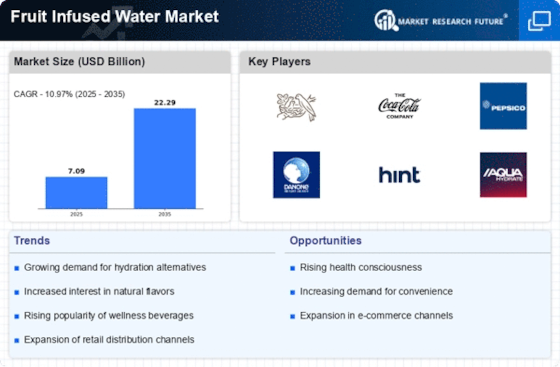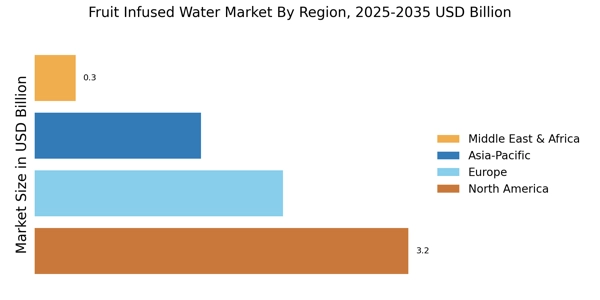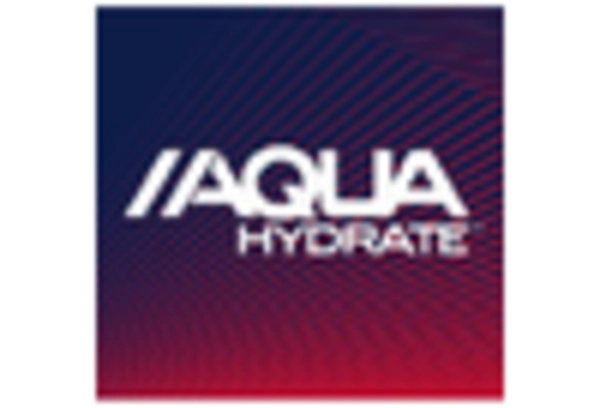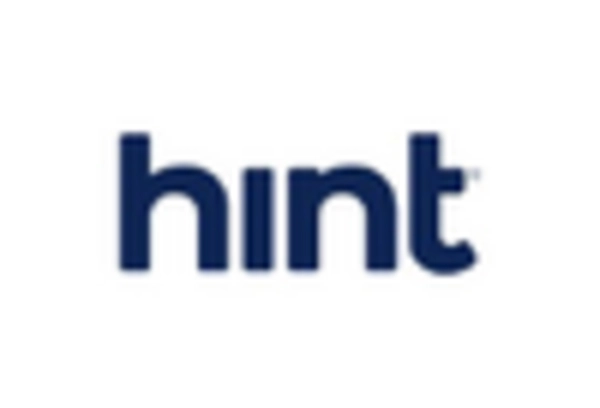Innovative Marketing Strategies
The Fruit Infused Water Market is witnessing a transformation driven by innovative marketing strategies employed by brands. Companies are increasingly leveraging social media platforms and influencer partnerships to reach a wider audience and promote their products. This approach appears to resonate well with younger consumers, who are more inclined to engage with brands that utilize modern marketing techniques. Market data suggests that brands that effectively communicate the health benefits and unique flavors of their fruit infused water are experiencing higher sales growth. Additionally, the use of visually appealing packaging and creative advertising campaigns is enhancing brand visibility and consumer interest. As competition intensifies, the ability to implement effective marketing strategies will likely play a crucial role in shaping the future of the fruit infused water market.
Rising Demand for Hydration Alternatives
The Fruit Infused Water Market is experiencing a notable increase in demand for healthier hydration alternatives. Consumers are increasingly seeking beverages that offer both flavor and health benefits, steering away from sugary sodas and artificial drinks. This shift is reflected in market data, which indicates that the fruit infused water segment is projected to grow at a compound annual growth rate of approximately 8% over the next five years. The appeal of natural ingredients and the infusion of vitamins and minerals into water are driving this trend. As consumers become more health-conscious, the demand for fruit infused water is likely to rise, positioning it as a preferred choice for hydration. This trend not only enhances the market's growth potential but also encourages manufacturers to innovate and diversify their product offerings.
Diverse Flavor Profiles and Customization
The Fruit Infused Water Market is characterized by an increasing demand for diverse flavor profiles and customization options. Consumers are seeking unique and exotic flavor combinations that cater to their individual preferences. This trend is evident in market data, which shows a rise in the popularity of products that offer customizable options, allowing consumers to create their own fruit-infused blends. The ability to personalize beverages enhances the consumer experience and fosters brand loyalty. Additionally, the introduction of limited-edition flavors and seasonal offerings is likely to attract attention and drive sales. As the market evolves, the emphasis on flavor diversity and customization is expected to play a pivotal role in shaping consumer choices and influencing purchasing behavior.
Increased Focus on Wellness and Lifestyle
The Fruit Infused Water Market is significantly influenced by the growing emphasis on wellness and lifestyle choices among consumers. As individuals become more aware of the impact of their dietary choices on overall health, there is a marked shift towards beverages that promote wellness. This trend is supported by data indicating that wellness-oriented products are gaining traction, with a substantial percentage of consumers willing to pay a premium for healthier options. The infusion of fruits into water not only enhances flavor but also provides essential nutrients, appealing to those who prioritize health in their daily routines. This focus on wellness is likely to drive the demand for fruit infused water, as it aligns with the broader movement towards healthier living and conscious consumption.
Sustainability and Eco-Friendly Practices
The Fruit Infused Water Market is increasingly aligning itself with sustainability and eco-friendly practices, reflecting a broader consumer preference for environmentally responsible products. Many brands are adopting sustainable sourcing methods for their ingredients and utilizing eco-friendly packaging solutions. This trend is supported by market data indicating that consumers are more likely to choose products that demonstrate a commitment to sustainability. The emphasis on reducing plastic waste and promoting recyclable materials is becoming a key differentiator in the market. As consumers become more environmentally conscious, the demand for fruit infused water that adheres to these principles is expected to grow. This alignment with sustainability not only enhances brand loyalty but also positions companies favorably in a competitive landscape.

















